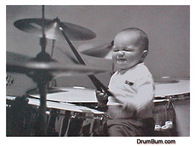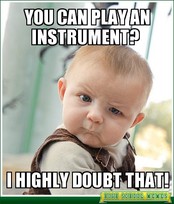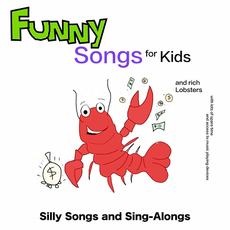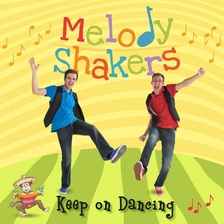 I’m a Model, if you know what I mean…? How many of you now have Right Said Fred’s biggest hit playing through your head? Firstly, I apologise if you do. Secondly, I hope I’ve made a point. Actually, I’m hoping to make two points. 1st Point - Music is a sticky and powerful medium. It has the ability to stay in our minds, being preserved for decades, with the potential to be regurgitated in beautiful clarity well into our late years. There are not many things that have this powerful ability. Even in cases of severe amnesia, the human mind has the ability to draw upon musical experiences while most other memories and skills have faded away. An amazing story that is well worth looking into is that of Clive Wearing. The two most prominent things in this man’s minute-long memory were the love for his wife and love for music. You can watch a short documentary about him here or listen to a fantastic audio presentation by Radiolab. I highly recommend doing both. 2nd Point – Modelling. I’m not talking about catwalks or clothing that looks like it has been made by a 4 year old with craft scissors and a mosquito net. I’m talking about “Monkey See, Monkey Do”, in the best sense of that phrase. From brushing teeth to using manners, leading by example is the most important teaching method that a parent can adopt. If you want your child to appreciate music, then you should lead the way. And here are some really easy ways that you can do that. 1. Read with your child – especially poetry. The links between language and music are extremely strong. To some degree, music and speech are the same thing. Both have elements of pitch, rhythm, articulation, phrasing and timbre (tone colour). Not convinced? Then try this. Say out loud, with meaning, “I’m sad”. Now, say out loud, also with meaning, “I’m happy!” Did you notice that the direction of your pitch changed for each? We frequently use pitch in our speech to convey our feelings. So here’s what to do. First of all you should be reading to your child. It’s a great way to bond and it will do wonders for their reading. Second of all, read with emotion, expression and clear articulation. The more emphases you place on your expression, the more musical your reading will be. Poetry is perfect for this. Not only is it filled with expression but it also has strong rhythmic elements such as metre and pulse. The ability to recognise rhythm in speech is a skill that is easily transferable to rhythm in music. In terms of what to read, most books by Dr Seuss are great. You can find out more about the link between music and language in articles such as this or in this brilliant podcast by Radiolab (I do like Radiolab).  2. Dance with your child – Even if you can’t dance well Don’t worry about how well you can dance. Even if your dance moves resemble someone who has their elbows and knees permanently locked while trying to swat flies, dancing with your child will encourage them to dance also. But why do we want to encourage our children to dance? There are many obvious reasons why dance is beneficial.
Here are some reasons why dance is important for developing musical skills
Overall, our visual and spatial senses are very effective at representing arbitrary ideas. Some ideas in music are not concrete enough to explain in words and this is where something like dance becomes extremely useful. You can research Dalcroze (Eurhythmics) to find more information in regards to this topic.  3. Sing – Even if it doesn’t sound good. Everybody can sing. Not everybody can sing well however. The same point applies for singing as it does dancing. Even if you’re terrible, do it. Make the most of it while you’re children are young enough to not give you feedback on your singing. If you can sing well, that’s fantastic. If you can’t, then at least you’re setting up the premise that singing is normal and enjoyable. If your child accepts singing as a normal and enjoyable practice then guess what! They’ll probably sing more. Singing is extremely beneficial for developing a good ear. A good ear will help to identify incorrect pitches and make adjustments when necessary. It will also help with improvising and composition (song writing). One of the best things you can do is get some singing lessons yourself. Getting a private tutor is great but (dare I say it) YouTube is an excellent starting point. And it’s free! Brett Manning is just one example of someone who offers some quality singing tutorials for free (and paid if you want). If you want to take singing really seriously, then look into the teaching method of solfege (Do-Re-Mi, Sound of Music stuff). You may also be interested in the Kodaly method as this heavily relies on singing and solfege. You’d be best finding a qualified music teacher for these methods.  4. Play an instrument – Even if you don't know how! If you can, try to play an instrument while your children are around. They will love to see you do this and it will inspire them to play an instrument too. Children imitate their parents. From carpentry to breastfeeding, children will want to do what their parents do. If you want your child to learn an instrument, then the best thing you can do is practice an instrument yourself. If for whatever reason, you can’t play an instrument, then play recorded music; at least once a day. And you can play anything. It doesn’t really matter. Classical, Reggae, Rock, Country, Jazz, Dance. Play music that you enjoy but also give them some variety. The wider the influence, the more diverse their understanding will be. The Main Idea As with all of the points mentioned, the most important thing is to lead by example and have fun! If you enjoy doing all of these things then you are creating positive experiences that will stay with your children for life. Even if they don’t end up playing an instrument or become a virtuoso violinist, you will have broadened their experience, given them important life skills, exposed them to the beauty of the arts and most importantly, spent quality time with your child.
0 Comments
Leave a Reply. |
FS4K Blog HomeAbout
Fun Stuff for Kids (The Blog) is all about providing parents, teachers and child carers with helpful hints, educational articles and fun ideas that children will love. Categories
All
Archives
June 2015
AuthorDavid Thurlow is an educator, entertainer, musician, husband, father and casual blogger |
Fun songs and sing alongs for the home, classroom, bus trip, camp and everyday life
© 2024 Funny Songs for Kids by David Thurlow
All lyrics are property of their respective owners & are provided for informational & educational purposes only.
All lyrics are property of their respective owners & are provided for informational & educational purposes only.


 RSS Feed
RSS Feed
